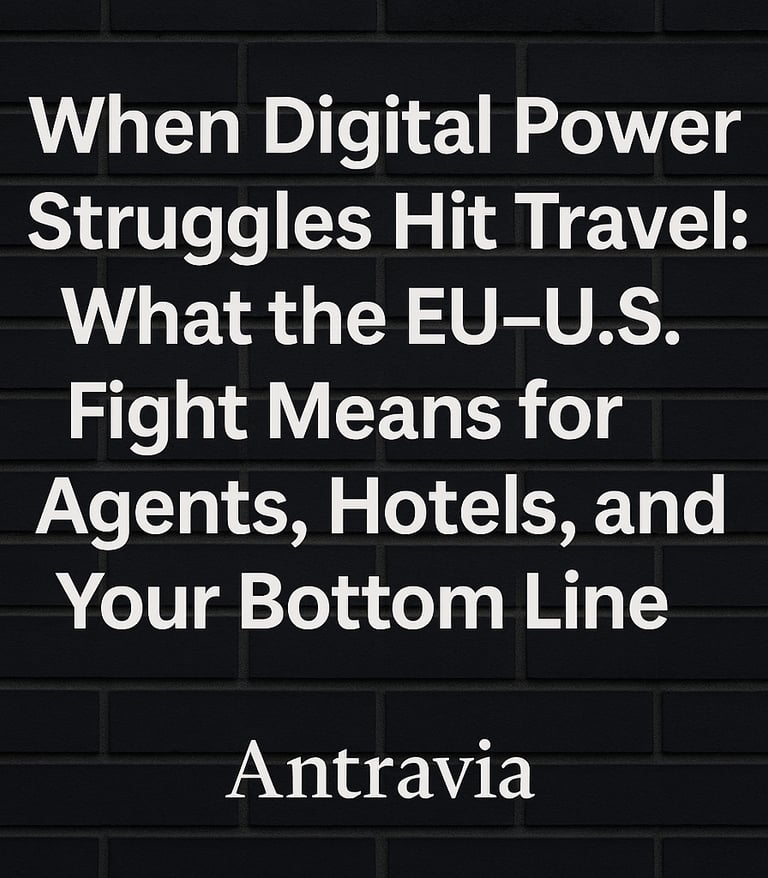
EU Digital Services Law: What Travel Agents and Hotels need to know
The EU’s Digital Services Act and new tech taxes could reshape travel. Learn how agents, hotels, and OTAs may face hidden costs, platform risks, and compliance traps.
BRANDUSA
8/28/20256 min read


When digital power struggles hit Travel: What the EU–U.S. Fight means for Agents, Hotels, and your bottom line
I woke up this morning to these news:
"The Trump administration is considering imposing sanctions on European Union or member state officials responsible for implementing the bloc's landmark Digital Services Act, as U.S. complains that the law censors Americans and imposes costs on U.S. tech companies. This move would be an unprecedented action that would escalate the Trump administration's fight against what it sees as Europe's attempt to suppress conservative voices"
and thought it would be good to provide more context, and discuss thede digital power struggles and why EU Tech laws and U.S. Sanctions could hit travel harder than you think.
If your travel business depends on digital platforms such as for marketing, bookings, client acquisition, or affiliate revenue, then you’re not just working in tourism. You’re actually a part of the global tech economy.
That means when lawmakers on either side of the Atlantic start fighting over platform control and digital taxation, this can affect you and your business.
As at August 2025, the EU has introduced sweeping new rules that directly impact U.S.-based platforms, and the Trump administration is reportedly preparing sanctions in response and not just against companies, but against individual EU officials who enforce the law.
(Update - As of October 2025, the EU's rolled out game-changing rules that smack U.S.-based platforms right in the wallet, and the Trump crew is ramping up sanctions, not just on the companies, but on individual EU enforcers. It's heating up fast.)
For most of the travel sector, this has flown under the radar. But there are risks... And they’re already shaping the platforms and tools we all rely on to sell, promote, and manage travel.
What’s Actually Happening
Two separate developments are behind this new flashpoint:
1. The Digital Services Act (DSA)
The DSA is a major EU regulation that came into force in late 2022. It targets “Very Large Online Platforms” (VLOPs), forcing them to comply with rules around content moderation, algorithmic transparency, and online advertising practices. Think Meta, Google, TikTok, Amazon and of course, yes, Booking.com, may be in the firing line.
The DSA isn’t a tax. It’s a regulatory framework. But compliance is costly, and most of the companies it targets are American.
The Trump team has accused the DSA of suppressing conservative voices and unfairly burdening U.S. businesses. There are credible reports they’re considering retaliatory sanctions and not against the platforms themselves, but against the EU officials involved in implementation. That would be an extraordinary move.
2. The Digital Services Tax (DST)
This is separate, and it is a tax. Countries like France, Italy, and Spain have already implemented a DST, which applies a 2%–3% tax on gross revenues earned by digital platforms from advertising, marketplace activity, and user data. These are taxes on revenue, not profit and they disproportionately hit U.S. tech firms.
Under Biden, the U.S. tried to phase these out through OECD reforms. That process stalled. Under Trump, the response could be more aggressive.
DAC7 requires platforms to report seller income - even from small businesses
DAC7, enforced from 2023, forces platforms like Booking.com, Airbnb, or Viator to report income earned by EU-based sellers (or non-EU sellers selling to EU customers) to tax authorities.
Why this matters for Travel
Most travel agency businesses aren’t the ones being sanctioned or taxed. But they rely on the platforms that are. And when those platforms change pricing, restrict content, or adjust visibility and the impact lands directly on travel agents, DMCs, and hotels.
Booking.com is being investigated under the DSA?
In March 2024, the European Commission confirmed that it was reviewing whether Booking.com qualifies as a Very Large Online Platform (VLOP) under the DSA. If confirmed, Booking would be subject to strict new rules around algorithmic transparency and content moderation, with a possible enforcement deadline in late 2025.
Meta and TikTok already face DSA enforcement actions
In 2024, the European Commission launched formal investigations into Meta (Facebook and Instagram) and TikTok for possible non-compliance with DSA rules on addictive design, misleading ads, and algorithm transparency.
▸ Reach and visibility are getting harder to control
If Meta or TikTok restrict European targeting to avoid compliance risk, or if Google deprioritizes certain content in its ad network, you’re affected and even if your business is based in the U.S.
Smaller agents and hotels who rely heavily on one or two platforms for client reach may find their visibility disrupted without warning. Some platforms may go further such as removing features, freezing ad accounts, or changing commission structures but not because of you, but because of broader legal exposure.
▸ Advertising costs will likely go up
When a 3% DST is imposed on platform revenue, it doesn't come out of platform profits. It gets passed on and often quietly, through higher ad rates or reduced reach for the same spend. In 2020, Amazon passed France’s 3% DST directly to its sellers. A similar shift by Meta or Booking.com could hit hotel or agent budgets without warning.
If you rely on Meta or Google Ads to drive client acquisition, watch your cost per lead. Even small percentage shifts can erode the already-tight margins many travel sellers work with.
▸ Compliance risk is rising, even for small sellers
DSTs and DAC7 (DAC7 requires digital platforms to report seller income to EU tax authorities, even for small operators) rules are reshaping the definition of “doing business” in the EU. If you receive income from affiliate programs, advertising, or marketplace listings tied to European users, you may be reportable — even without a legal entity in Europe.
That includes agents earning via travel blogs, hotels on third-party platforms, and DMCs using marketplace channels.
What you should do now
Here’s where to start:
✅ Review your client acquisition channels. If more than 70% of your leads come from one platform, you’ me be overexposed. Start diversifying now.
✅ Understand your platform relationships. If you earn money via affiliate sales, marketplace listings, or advertising tied to the EU, check whether you fall under DST or DAC7 rules.
✅ Track your cost per sale. Don’t just look at ad spend. Look at what you’re getting for it, and whether that’s shifted in the last six months. Price changes from DST fallout may not be labeled.
✅ Get smart about reporting. The definition of taxable presence is changing. Don't assume you're too small to matter — that’s not how automated platform reporting works anymore.
Final Antravia Thought
You don’t have to understand every word of the EU’s 160-page Digital Services Act. But you do need to know what happens when your visibility gets restricted, your ads cost more, and your commission payments get caught up in compliance flags.
If you’re still treating platform policy as a tech issue, you’re behind. This is a financial issue — and it’s not going away.
Antravia helps travel agents and hospitality businesses think beyond platform loyalty and short-term wins. We help you build a financial structure that can survive the next round of global policy shifts
References
European Commission – Digital Services Act
"Digital Services Act: Commission designates Very Large Online Platforms and Search Engines."
European Commission Press Release, April 2023
https://ec.europa.eu/commission/presscorner/detail/en/ip_23_2406Reuters – Booking.com Under Review
"Booking.com among 30 platforms being assessed under EU Digital Services Act."
Reuters / Euractiv, March 2024
https://www.euractiv.com/section/platforms/news/eu-digital-services-act-received-30-vlop-vlose-self-assessments/European Commission – TikTok Investigation
"Commission opens formal proceedings against TikTok under the Digital Services Act."
European Commission, February 2024
https://ec.europa.eu/commission/presscorner/detail/en/ip_24_247Reuters – Meta Faces DSA Probe
"Meta faces EU probe over addictive Facebook, Instagram use by kids."
Reuters, May 16, 2024
https://www.reuters.com/technology/meta-faces-eu-probe-over-addictive-facebook-instagram-use-by-kids-2024-05-16/Deloitte – DAC7 and Platform Reporting
"DAC7: New tax transparency rules for digital platforms."
Deloitte Luxembourg, 2023
https://www2.deloitte.com/lu/en/pages/tax/articles/dac7-digital-platforms.htmlReuters – Amazon Passes DST to Sellers
"Amazon to pass French digital tax to sellers from October 1."
Reuters, August 2019
https://www.reuters.com/article/us-france-tax-amazon-idUSKCN1VC0ZGUSTR – U.S. Response to DSTs
"USTR Announces Results of Section 301 Investigations of Digital Services Taxes."
Office of the United States Trade Representative, June 2021
https://ustr.gov/about-us/policy-offices/press-office/press-releases/2021/june/ustr-announces-results-section-301-investigations-digital-services-taxesOECD – Pillar One and Pillar Two Reform Delays
"OECD/G20 Inclusive Framework on BEPS."
Organisation for Economic Co-operation and Development (OECD), 2024
https://www.oecd.org/tax/beps/oecd-g20-inclusive-framework-on-beps.htm


Antravia Advisory
Where Travel Meets Smart Finance
Email:
Contact us:
Antravia LLC
© 2025. All rights reserved. | Disclaimer | Privacy Policy | Terms of Use | Accessibility Statement
Antravia.com - Global site of the Antravia Group.
Antravia.com | Antravia.co.uk | Antravia.ae |
Finance.travel | Tax.travel | Consultancy.travel | VAT.travel | VAT.claims |
USSales.tax | EuroVAT.tax | UKVAT.tax |
contact@antravia.com
Antravia LLC
4539 N 22nd St., Ste. N
Phoenix
Arizona
85016
